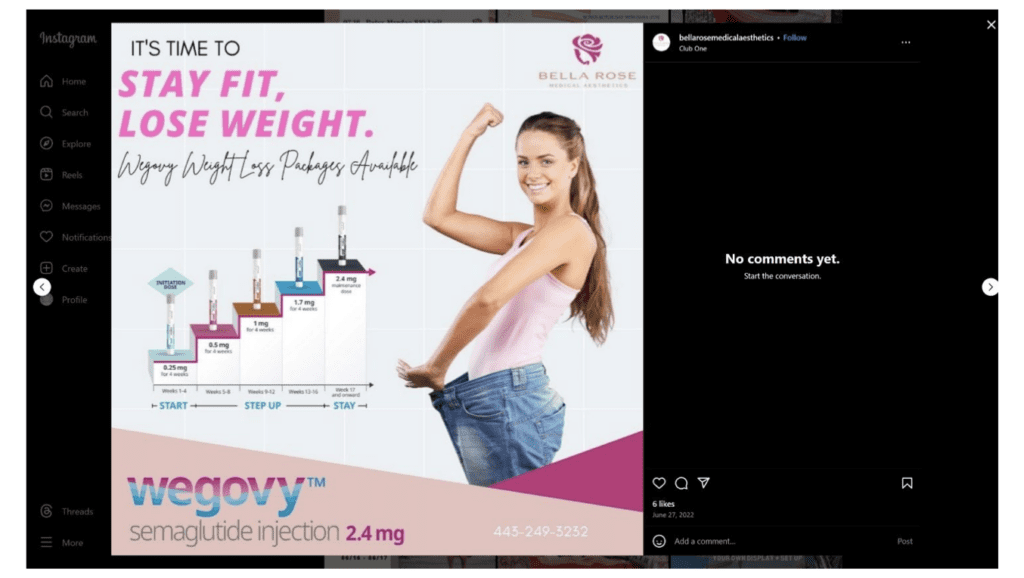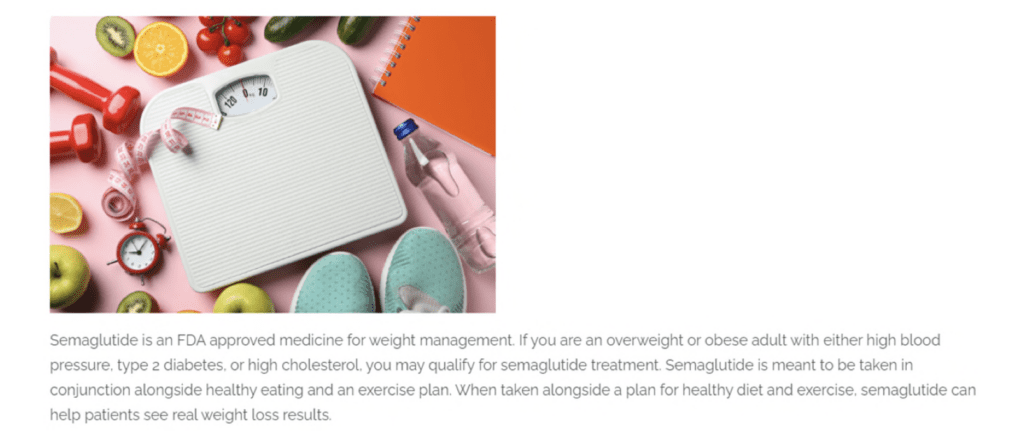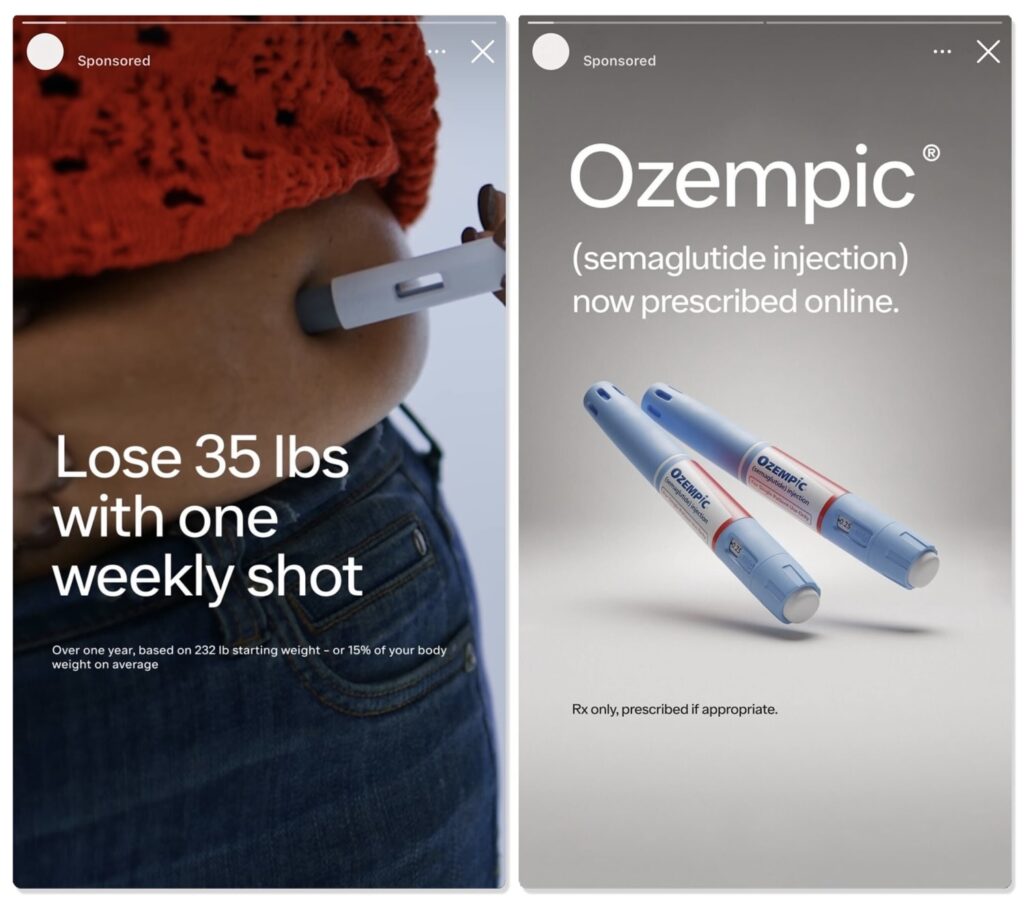One of the buzziest brands on the market right now is not owned by a sportswear behemoth or a luxury goods conglomerate; it is Ozempic, a diabetes drug that has garnered outsized attention and appeal due to its powerful weight-loss effects. Faced with a growing economy of imitation drugs looking to piggyback on demand for its brand, Ozempic maker Novo Nordisk is escalating its trademark enforcement efforts. According to the dozens of lawsuits that it has filed since the beginning of September, alone, Novo Nordisk is targeting companies marketing “unapproved compounded” versions of its FDA-approved Ozempic and Waegovy products, lodging various infringement-related arguments and accusations that illustrate not only the value of its products but also the lengths it will go to protect them as they increase in popularity.
Two recently-filed lawsuits, for example, one filed in federal court in Maryland against med spa Bella Rose LLC and the other in Florida against Transforming Wellness LLC, shed light on the growing scope of Novo Nordisk’s enforcement efforts. By way of these lawsuits (and many others just like them), Novo Nordisk is targeting companies that allegedly use its Ozempic and Wegovy marks “to market and sell … compounded drug products that purport to contain semaglutide and that are not approved by the FDA.” According to Novo Nordisk, these actions mislead consumers into “mistakenly believing that they are purchasing authentic Novo Nordisk medicines or medicines that have been evaluated by the FDA, studied in clinical trials, and deemed safe and effective” when that is not the case.
A Wave of Litigation to Protect Valuable Brands
Novo Nordisk’s recent litigation blitz comes hand in hand with the increasing popularity of its semaglutide-based medications, particularly Ozempic for type 2 diabetes and Wegovy for weight management, according to the complaints. Both drugs have experienced a massive increase in demand, driven by clinical evidence of their effectiveness in managing blood sugar levels and aiding significant weight loss. However, the pharmaceutical landscape has also seen a rise in compounded versions of semaglutide being marketed by various clinics and wellness centers, which are not FDA-approved, in light of the spike in consumer interest.
In one such suit, which it filed with the U.S. District Court for Maryland on September 30, Novo Nordisk alleges that Bella Rose LLC (operating as Bella Rose Medical Aesthetics & Wellness) engaged in trademark infringement by using the Ozempic and Wegovy trademarks without authorization. According to the complaint, Bella Rose uses Novo Nordisk’s Ozempic and Wegovy marks “to market and sell to patients compounded drug products that purport to contain semaglutide” and that such use “falsely and misleadingly represents to patients that its products are FDA-approved or the same as, or equivalent to, Novo Nordisk’s FDA-approved semaglutide medicines.”

Bagsværd, Denmark-headquartered Novo Nordisk claims that in addition to using the Ozempic and Wegovy marks in its marketing materials, Bella Rose has also used hashtags like Ozempic and Wegovy on social media posts to confuse customers into purchasing unapproved compounded versions of semaglutide. Such use of the Novo Nordisk trademarks is “likely to confuse and deceive patients into mistakenly believing that they are purchasing authentic Novo Nordisk medicines or medicines that have been evaluated by the FDA, studied in clinical trials, and deemed safe and effective,” the company contends.
This not only misleads patients, but also poses significant health risks, as these compounded products have not undergone the rigorous FDA approval process that ensures safety, quality, and effectiveness, according to Novo Nordisk, which is seeking monetary damages, injunctive relief, and corrective advertising to inform consumers that its products are not equivalent to FDA-approved semaglutide medications.
In a separate but similar case that it filed in the U.S. District Court for the Southern District of Florida, Novo Nordisk alleges that Transforming Wellness LLC sold compounded semaglutide products and that it has falsely implied that they are FDA-approved or equivalent to Ozempic and Wegovy. With the foregoing in mind, Novo Nordisk alleges that Transforming Wellness is “likely to confuse and deceive patients into mistakenly believing that they are purchasing authentic Novo Nordisk medicines.”
Beyond its trademark infringement and unfair competition claims, Novo Nordisk also alleges that Transforming Wellness is on the hook for false advertising under the Lanham Act and Florida’s Deceptive and Unfair Trade Practices Act. For instance, Novo Nordisk maintains that Transforming Wellness referred to clinical studies conducted on Novo Nordisk’s FDA-approved drugs to promote its own compounded products, without conducting any placebo-controlled studies on its compounded versions. The problem, per Novo Nordisk, is that Transforming Wellness’ “unapproved compounded drugs” have not been subjected to the same clinical studies and trials, or “otherwise achieved certain therapeutic outcomes attributable to” Novo Nordisk’s products.

In that case (and others), Novo Nordisk has asked the court order Transforming Wellness to permanently refrain from marketing its products in ways that are likely to confuse or otherwise mislead consumers; it is also seeking a disgorgement of the company’s profits, damages for the harm caused to Novo Nordisk’s brand, and corrective advertising to clear up the allegedly misleading claims.
THE BIGGER PICTURE: Novo Nordisk’s recent lawsuits against Bella Rose and Transforming Wellness, among other defendants, as well as the flurry of cease-and-desist letters that its counsel is sending behind the scenes, reflect a robust effort by Novo Nordisk – which has amassed a market cap of more than $500 billion thanks to its Ozempic and Wegovy drugs – to take action against unauthorized compounded products that seek to piggyback on the enduring demand for its Ozempic and Wegovy products. As its products have gained immense popularity, the pharma titan has ramped up its legal efforts to protect these valuable brands.
The company has made headlines for waging litigation against clinics, med spas, and pharmacies over the past year, with many of those cases settling out of court and the defendants agreeing to permanently refrain from using any Novo Nordisk trademarks or logos and from engaging in any “misleading” advertising with regard to compounded semaglutide products, among other things.
This aggressive legal approach demonstrates Novo Nordisk’s enduring pursuit to safeguard its intellectual property and ensure that only authentic (and FDA-approved) versions of its products are sold to consumers. These lawsuits serve as a reminder that companies with popular portfolios of brands are willing to vigorously defend their intellectual property rights and seek to shut down any unauthorized uses of their trademarks no matter the industry. And this is proving to be particularly true as drugs like Ozempic rival more traditional consumer goods companies for the title of hottest brand on the market.
The cases are Novo Nordisk, et al., v. Transforming Wellness LLC, 0:24-cv-61820 (S.D. Fla.) and Novo Nordisk, et al., v. Bella Rose LLC, 1:24-cv-02815 (D. Md.).











